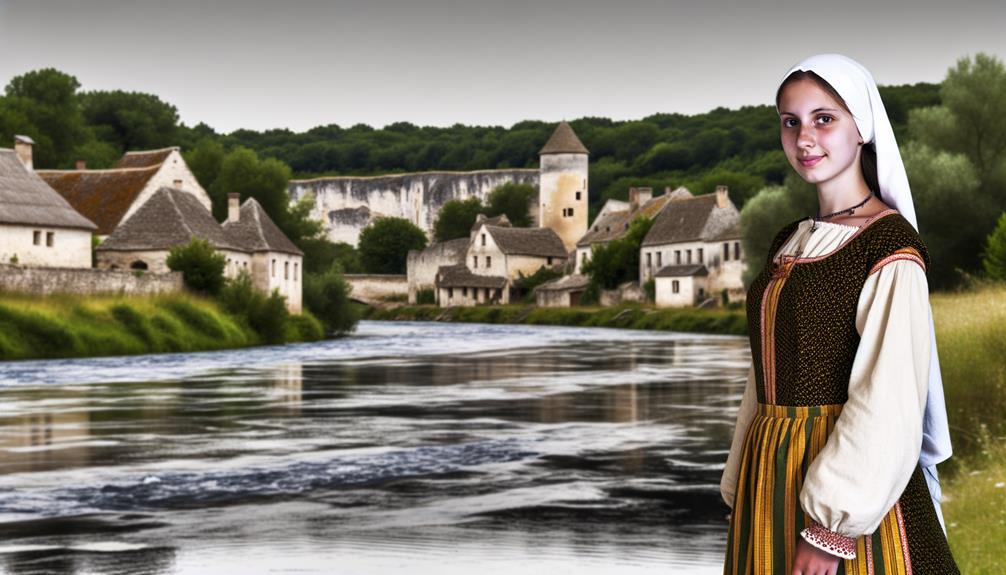Allison Meaning of Name Origin
The name 'Allison' derives from medieval French origins, evolving as a diminutive of 'Alice.' 'Alice' itself stems from the Old High German name 'Adalheidis,' which means 'noble kind.' Introduced to England post-1066 Norman Conquest, 'Allison' combines the Old French suffix '-on' with 'Ali' from 'Adalheidis.' The name's adaptation from a surname to a given name during the 19th century underscores significant sociolinguistic shifts. Its contemporary popularity, particularly in North America and Western Europe, exemplifies its enduring appeal.
To understand the cultural impact and variations of 'Allison,' examining its historical evolution provides rich insights.

Key Takeaways
- 'Allison' originated from the medieval French diminutive 'Alison' of 'Alice,' meaning 'noble kind.'
- 'Alice' comes from the Old High German name 'Adalheidis,' signifying nobility.
- The name 'Allison' was introduced to England post-Norman Conquest in 1066.
- It evolved from a surname to a given name by the 19th century.
- Variations like 'Alison,' 'Alyson,' and diminutives like 'Allie' show its adaptability.
Linguistic Roots
The name 'Allison' finds its linguistic roots in the medieval French name 'Alison,' itself a diminutive form of 'Alice,' which was derived from the Old High German name 'Adalheidis,' meaning 'noble kind' or 'of noble birth.'
This etymological progression reflects a rich tapestry of linguistic evolution. The transformation from 'Adalheidis' to 'Alice' and subsequently to 'Alison' underscores the fluidity of language and the influence of cultural interchange. Old High German, a precursor to modern German, contributed significantly to the lexicon of medieval Europe.
It is notable that 'Adalheidis' embodies the socio-political values of nobility and lineage, themes central to medieval European societies. This evolution signifies not only linguistic adaptation but also the perpetuation of certain cultural ideals across generations.
Medieval Origins
During the medieval period, the name 'Allison' emerged as a reflection of the era's complex interplay of linguistic and cultural influences.
Originating from the Norman French diminutive form of 'Alice', the name was introduced to England following the Norman Conquest of 1066. This period was marked by significant Norman influence on the English language and naming conventions.
Allison, which combines the Old French suffix '-on' with 'Ali', a derivative of 'Adelheidis' meaning 'noble kind', became more prevalent. The blending of Old French and Old English elements during this time facilitated the name's integration into English society.
Consequently, 'Allison' not only signifies noble lineage but also embodies the rich, multicultural tapestry of medieval England.
Evolution Over Time
Over the centuries, the name 'Allison' has undergone significant changes, reflecting broader socio-cultural shifts and linguistic evolutions. Originating from the medieval diminutive of Alice, Allison initially emerged in England and Scotland as a surname.
The name transformed into a given name by the 19th century, particularly in English-speaking countries. This period saw a rise in the popularity of surnames as first names, a trend influenced by the growing emphasis on individuality and familial heritage.
Pronunciation and spelling variations, such as 'Alison' and 'Alyson,' further illustrate the name's adaptability across different regions and time periods. The evolution of 'Allison' encapsulates a dynamic interplay between linguistic developments and societal changes, making it a compelling subject for onomastic studies.
Cultural Significance
The name Allison, with its historical roots tracing back to medieval England and Scotland, carries significant cultural weight. Its evolution from a patronymic surname to a popular given name illustrates broader societal trends and influences. In addition to its historical significance, the name Allison has also garnered attention for its modern interpretations and variations. Many people are drawn to the name’s connection to strength and nobility, as well as its versatility in different cultures and languages. The Sadie name meaning, on the other hand, represents a more playful and cheerful connotation, which adds another layer of complexity to the exploration of names and their meanings. Overall, the study of names like Allison and Sadie offers valuable insights into the intersection of history, language, and identity. Furthermore, the exploration of names extends beyond just Allison and Sadie; for instance, the fiona name meaning conveys notions of purity and fairness, further enriching our understanding of naming traditions. Such nuances remind us that names are not merely labels; they reflect cultural heritage and personal significance. As we delve deeper into the meanings and origins of names, we uncover the intricate tapestry of human experience that shapes our identities.
In contemporary society, Allison maintains a notable presence, reflecting both its enduring appeal and the dynamic nature of cultural identity.
Historical Context and Roots
Rooted in Old French and medieval English traditions, the name Allison traces its etymology back to the Norman conquest of England, reflecting a rich tapestry of cultural and linguistic evolution. The name is derived from the Old French diminutive of ‘Alice,’ itself stemming from the Germanic ‘Adalheidis,’ meaning ‘noble’ or ‘of noble kind. ‘ In modern usage, the name Allison has spread beyond its origins in England and France to become popular in various English-speaking countries. Its widespread appeal may be attributed to its timeless and elegant sound, as well as the positive connotations of nobility and grace. In recent years, the name has also taken on new significance in the digital age, with the rise in popularity of the virtual assistant known as Alexa, further influencing the meaning of the name Allison. The meaning of Alexa name has expanded to include notions of intelligence, helpfulness, and modernity.
The historical significance is multifaceted:
- Norman Influence: Post-1066 Norman invasion, Old French names permeated English culture.
- Medieval Usage: Popularity surged in medieval England, often linked with nobility and royal lineage.
- Etymological Evolution: Shifted from 'Alice' to 'Alison' and later 'Allison' in various dialects and regions.
This historical context underscores the name's enduring legacy and its intricate connection to European heritage.
Influence in Modern Society
In contemporary society, the name Allison has maintained its widespread appeal, symbolizing a blend of historical resonance and modern-day versatility. Derived from the medieval French name Alis, a diminutive of Alice, Allison has transcended its origins to become a unisex name in English-speaking cultures.
Its adaptability is evident in its usage across various social strata and professional fields, reflecting both traditional and progressive values. The name's popularity is reinforced through its frequent presence in literature, media, and pop culture, further embedding it within the cultural fabric.
In modern contexts, Allison is often associated with qualities such as reliability, intelligence, and elegance, making it a favored choice for parents seeking a name that balances historical depth with contemporary relevance.
Popularity in Modern Times
In recent decades, the name Allison has experienced a noteworthy rise in popularity, reflecting broader socio-cultural trends.
Analyzing geographic distribution reveals substantial variance, with higher concentrations in North America and Western Europe.
Influences such as media representation and historical figures have markedly impacted its contemporary cultural resonance.
Rising Trend Analysis
The name Allison has seen a notable resurgence in popularity throughout recent decades, reflecting broader cultural and societal shifts. This renaissance can be attributed to several factors, including its phonetic appeal, gender-neutral versatility, and historical significance.
Over the past 50 years, Allison has consistently appeared in the top 100 names for girls in the United States.
Phonetic Appeal: The name's melodious sound appeals to contemporary naming trends.
Gender Neutrality: Increasing preference for unisex names contributes to its popularity.
Historical Significance: Its Anglo-Saxon roots and literary presence enhance its timeless charm.
This upward trend underscores a broader movement towards traditional yet adaptable names, aligning with evolving preferences in modern naming conventions.
Geographic Popularity Distribution
While Allison's resurgence reflects a broader trend towards traditional yet flexible names, its geographic popularity distribution reveals intriguing regional variations across modern times.
In the United States, Allison has consistently ranked high in the South and Midwest, suggesting a cultural affinity for names with historical and familial resonance.
In contrast, its usage in coastal regions like New York and California has seen moderate yet steady growth, indicating a balanced appeal across diverse demographics.
Internationally, Allison maintains significant popularity in countries such as Canada and Scotland, reflecting its Gaelic roots.
These patterns underscore the name's versatility and widespread acceptance, while also highlighting how regional cultural contexts shape naming conventions.
Such geographic trends offer valuable insights into contemporary societal naming practices.
Influences and Cultural Impact
Examining the influences and cultural impact of the name Allison in modern times reveals a complex interplay of historical roots, media representation, and evolving societal norms.
Historically, Allison, originally a diminutive of Alice, gained popularity in English-speaking countries.
Media representation has notably influenced its adoption, with characters named Allison appearing in popular television series and films, further embedding it into contemporary culture.
Societal trends towards gender-neutral names have also contributed to its sustained popularity.
These factors collectively underscore the name's enduring appeal and cultural significance.
Variations and Nicknames
Several variations and nicknames for the name Allison have emerged over time, reflecting its historical evolution and cultural adaptations. The name Allison, originally derived from the Norman French diminutive of Alice, has seen numerous permutations across different regions and eras. These variations often highlight subtle shifts in linguistic preferences and cultural influences. For instance, the name may appear as "Alison" in some English-speaking countries, while in others, diminutives like "Allie" or "Ally" are prevalent.
| Variation | Region |
|---|---|
| Alison | United Kingdom |
| Alyson | France |
| Allie | United States |
| Ally | Australia |
These variations and nicknames serve not only as identifiers but also as reflections of the name's rich and diverse heritage.
Conclusion
The name 'Allison' emerges from the mists of medieval Europe, evolving through various linguistic and cultural transformations. Its robust journey from a diminutive form of Alice to a name of independent stature showcases the intricate tapestry of language and history.
Today, 'Allison' holds a prominent place in modern nomenclature, symbolizing both tradition and contemporary appeal. Its variations and nicknames further enrich its legacy, weaving a complex and enduring narrative within the cultural fabric.






